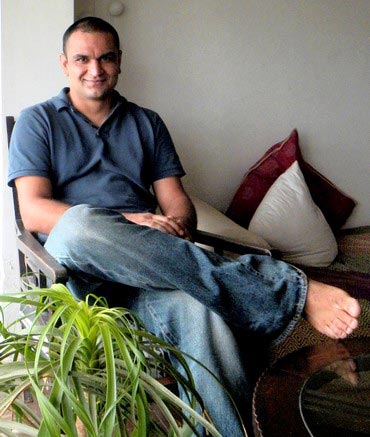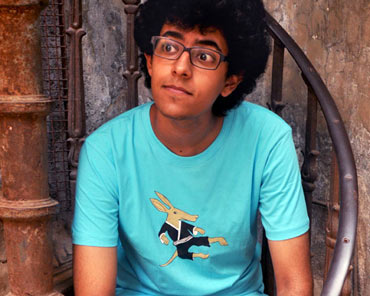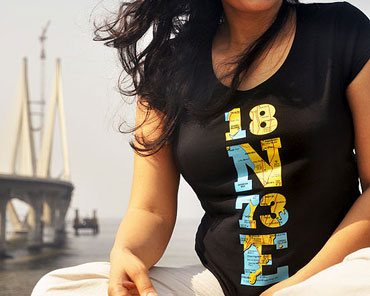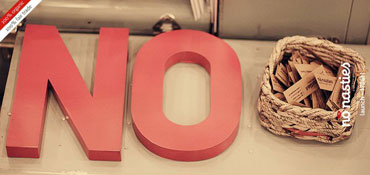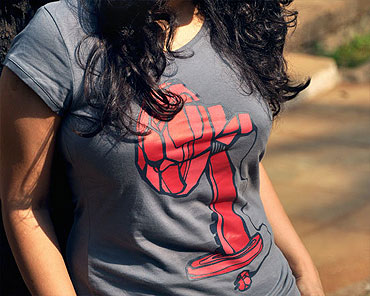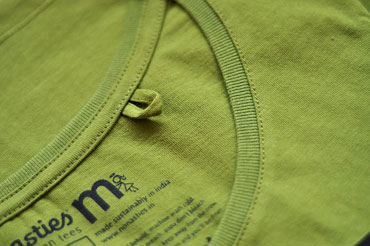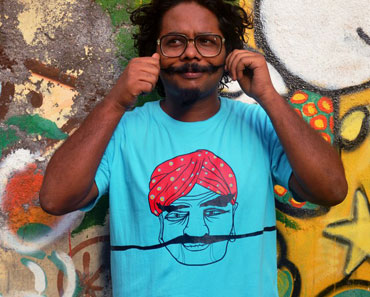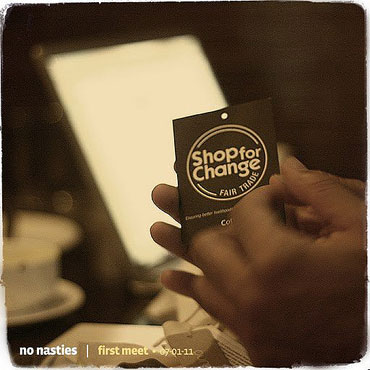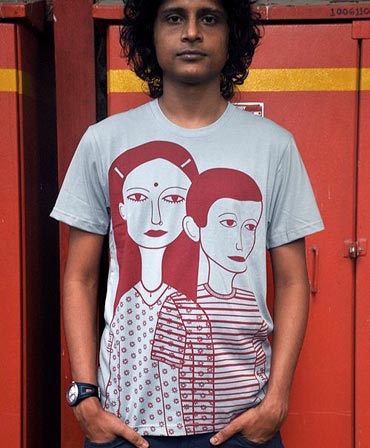 | « Back to article | Print this article |
The techie who quit his job to help poor farmers
Meet Apurva Kothari, who decided to let go of his cushy job in the Silicon Valley and has now started up an eco-friendly and fair-trade t-shirt company in India
A little over three years ago Apurva Kothari he heard about farmer suicides in the cotton belt in India.
Kothari's was a typical story -- an engineer from India going to the US to complete his Master's programme, staying back and making the big bucks. He was married to his college sweetheart and it seemed like they were indeed living the American dream.
When Kothari began reading about farmer suicides in India's cotton belt and something told him he should be making a difference.
Kothari had already begun switching to a more eco friendly (or sustainable) lifestyle -- using local produce, wearing eco-friendly clothes etc. but he of all people knew this was not enough.
If he really wanted to make a difference to his countrymen he would have to return home. And that was what he did.
A year after he returned to India, Apoorva Kothari started working on creating a t-shirt brand that would not just be eco friendly but also wouldn't exploit the farmers in the country.
It has been about four months since No Nasties has been launched along with his business partner Diti Kotecha.
The philosophy of the t-shirt brand is based on the understanding that 'people want to make a difference but do not necessarily want to change their lifestyle'.
The idea is also to be able to cater to the design sensibilities of young Indians AND create a product that is sustainable.
This however is easier said than done. Apurva Kothari who runs the company with Diti tells us about the challenges of being a social entrepreneur with just two people and why he chooses to walk that path nonetheless.
'People want to make a difference but don't want to change their lifestyle'
At the outset, could you tell us something about No Nasties?
No Nasties is a sustainable brand trying to offer customers an eco friendly and ethical choice for shopping.
At this point we are a t-shirt company but we hope to expand into a fashion line.
(We realise that) people want to make a difference but do not necessarily want to change their lifestyle. So we try to meet customers where they are.
You don't have to change your design sensibilities or your sense of fashion.
We will give you t-shirts that you'd normally wear and just by making the purchase of that item you will impact farmers lives and the environment.
We are based on the principle of being fully organic and fair trade.
We are 100 per cent organic and fair-trade certified -- from seed to product.
'Farmers have been committing suicide at the rate of one every 30 minutes'
Why did you choose to get into this line of business?
It started about four years ago. I was working in a tech job in the US and I read about the plight of the farmers in India's cotton belt and was shocked.
Today the farmers have been committing suicide at the rate of one every half an hour. And yet there is very little awareness and support despite the many articles that are being written (about this issue)
So far about 250,000 farmers have already committed suicide and not enough has been done.
Back in the US, I tried to switch over my lifestyle. As far as clothes were concerned, I found them to be far too preachy -- with messages about saving the planet (etc) and realised that not a lot of them were meeting my design sensibility.
You can't wear (these kinds of t-shirts) to work and I also realised that you don't want to be a different person by changing your design sensibility.
So I saw that as an opportunity.
In India, I realised that there was a lot of work being done at the grass root levels (in the area) but most of it wasn't being given recognition.
All the work is exported and as a consumer in India, one doesn't have a choice.
I wanted consumers to have that choice and with the market booming and the middle class having more disposable income, I felt it was time to make more ethical choices.
What we are trying to do is to ensure that everyone is getting a fair deal -- it starts from farmers and factory workers and ends with the designers who design our t-shirts.
We don't make the most of any situation and rather create a win-win situation.
The idea is to create a brand that is seen as a cool brand to wear, slowly create a market where people are demanding organic and ultimately create a consumer movement.
'We don't want to be looked at as a social enterprise'
When did you start working on this idea?
9 months ago I approached Diti Kotecha, a photographer, graphic designer, an urban organic farmer and a social worker. I'd known her because she and I play on the Mumbai Ultimate Frisbee team.
I always wanted to find like-minded people and Diti's moral north was the same as mine. So we got together and formed No Nasties.
We didn't want to be looked at as a social enterprise but rather as a cool brand that people could relate to not because it was doing something for a social cause but because of what it is.
So we invited people we knew to send in their designs for t-shirts. These were people from diverse backgrounds and the only brief we gave them was that the design shouldn't be preachy.
Some were friends, ex-colleagues, people I met at the farmers market one of them is even a retired professor from the JJ School of Art. And each of them had this large collection of art and design, which was just lying idle in their portfolio.
These people were busy in their day jobs and had no way of exposing their work to the crowds.
We on the other hand were (and are) open to new designers. So it wasn't really difficult to get ten designs as much as it was to zero in on them.
How did you go about setting up a business that is eco friendly and fair-trade? Could you take us through the process?
Well the thing that took us the most time to figure out was the supply chain.
Shop for Change Fair Trade, a not for profit organisation that promotes the of fair trade in India put us in touch with a few farmers' co operatives.
There aren't a lot of farmers' co-operatives (that work in the field of organic cotton farming) -- there's Chetna, Agro Cell and Zameen.
We spoke to all of them but Chetna seemed like the right fit and were very helpful in establishing partnerships.
Chetna in turn put us in touch with a few factories.
We visited these factories and finally settled in on Rajlakshmi Cotton Mills in Kolkata.
The mill that was once a traditional cotton mill and is now transformed into a completely organic and a fully fair-trade certified factory.
So we gave them our first round of orders by pooling in the ten designs.
Then it all came together in a few months and we launched on April 15 at the organic vegetable market at the Turf Club in Mumbai.
'(Our factory) is committed to a fair trade model'
Your website speaks about the labour policies at Rajlaxmi. Could you tell us something more about it?
Rajlaxmi was once a traditional cotton mill that is now fully transformed. Rajat who heads it now is the new generation of the family that owned it. He convinced his family to give up the old ways and think forward.
So today they are committed to a fair trade model where they don't just pay the workers their wages but also pay them a premium for community development and allow them to form unions, pay them overtime, provide free education for their children and loans for social events.
We had visited a few other factories but realised that the organic and fair-trade aspect was just a part of the business.
Rajlaxmi however has adopted it completely and you could see it. The workers looked happy and relaxed; we even spoke with a few of them.
When we researched about the factory, we realised that most of the international (eco-friendly and fair-trade certified) brands are also working with Rajlaxmi. So I realised that it was indeed genuine.
Rajlaxmi was happy to work with us because they wanted to see an Indian brand make an impact in the domestic market.
We also realised that the farmers at Chetna had an equity stake in the factory, which was even better!
'I wanted to do something that had a higher calling'
Could you tell us something about yourself? You were in the US. Why did you move back?
I have an MSc in electrical and computer engineering and I was a software programmer before switching over to technology management and running engineering and product design teams.
I've worked as a product designer and manger worked for Deloitte, Australia, heading a team there.
Even though the money in my job was good and I was getting wealthier so to say, I wasn't getting happier and wanted to do something that was people and planet friendly.
My wife Shweta is a fashion designer and I was working in NY for a while when she wanted to come to Bombay and start her fashion line.
Today, Shweta runs a couple of designer stores called Attic in Colaba and Santacruz and also has a fashion line of her own.
A year after she returned to India, I followed.
I always wanted to do something that had a higher calling. For a while I partnered with a friend for scuba diving trips but soon began to feel selfish and that I should do something that would be more financially viable.
So I settled down in Mumbai and started working on this.
'We could create a larger pie!'
Do you lead an eco friendly lifestyle?
I have tried to switch over as much as I can. It is easier (to be more eco friendly) in the US because there are a lot more local markets and you can afford to buy fair trade products there.
In India, it isn't that easy. (Eco friendly and fair-trade) Products are either not available or just very expensive.
But I try to buy as much local stuff as possible. I cycle around as much as I can and I volunteer for Hari Bhari Tokri (a Mumbai-based association that partners with a local farmer for a regular supply of crunchy, organic vegetables)
How do you plan to expand?
We are trying to be conscious that we are a social business. So we want to focus on the social as well as its business side. (We also realise) we can make a larger social impact, if we are successful as a business.
We were selected as one of the investees for Unlimited India for 2011. It is an incubator programme for social business that helps with financial funding to some extent but to a large extent with non-financial guidance, mentorship and legal guidance
Right now we are going through the exercise to see where No Nasties will be in the long run.
The current thinking is to establish brand that consumers trust and go beyond being a t-shirt company to being a brand that is doing the right thing and creating a win-win situation for everyone associated with it.
How we are going about with it is by having an open communication with our buyers and collaborating with different social causes -- for every t-shirt you purchase, we give 10 per cent of it to various social causes.
We want to help other brands switch over to organic and are happy to share our supply chain with them, so rather than fighting for a larger piece of the pie, we could create a larger pie!
'We have success stories in ethical companies before us'
So how financially viable is your business?
We have received a good response so far.
It's been three months so we are still trying to break even but we have a solid business plan and we have success stories in ethical companies such as Fab India and Anokhi (among others)
In about three months, we've sold about 300 tees, which is good. But in less than a year we are hoping to sell about 1000 t-shirts each month.
We're hoping to achieve it by creating a larger community on Facebook and Twitter and trying to be open about what we are doing.
We've also started to different stores around the country and have been retailing from Ahmedeabad and Pune (among other cities).
What are your t-shirts priced at?
They're available online at Rs 999 and in stores at Rs 1199
The feedback was that it is a little expensive. Our take is it might be expensive for some folks but (not necessarily) for people who buy Nike and Reebok.
We are however re-working our pricing soon and making it dynamic so even if you cannot afford it and still want to make a difference, you can pay as much as you want.
There are plans of introducing new lines that are less expensive and have been designed by in-house designers so we save on costs and creating products beyond t-shirts -- like tops for women where pricing can change.
'Cash flow is always a challenge'
What would you say were the challenges you faced while setting up?
The first big challenge was to find a fully sustainable supply chain. That took some time -- finding likeminded people and getting it going.
The costs for fair-trade products are quite high. Fair-trade, organic t-shirts cost the times more than regular ones. That is a challenge as it means higher capital costs for us!
As per our agreement, we have to pay Rajlaxmi 50 per cent on order 50 on delivery. So cash flow is always a challenge.
Creating market awareness is another issue that we face as fair trade is a fairly new term even though the concept of organic has been around for a while now in cities such as Mumbai.
Finally, the most important thing is always about how to the word out and how much money do we spend on marketing and distribution. Also since it's just Diti and me right now, we do everything -- from designing the website to packing t-shirts for delivery -- which takes us away from core task of creation.
How are you planning to address the cash flow challenge?
Well, right now we don't have a solution. We are funding the company from my personal savings. I've invested Rs 5 lakh in the first stage. I was hoping that the first round of t-shirts would allow us to expand into but that hasn't happened. So we're still trying to figure out for next round of funding -- we'd probably look for grants for social ventures or take a loan.
'Helps to have business plan or rich uncles'
What would you say have been your greatest learnings?
As a social entrepreneur I have to remember why I am doing this. It is tempting to go back (to a day job) but I have to keep telling myself that there is a reason why I switched.
The time it takes to set up can be stressful. You don't have same income or spending power. Getting support from the family is important.
The product must sell for not because of the story behind it but for itself. Unless people like the product, they won't buy it.
It always helps to have business plan or rich uncles. Sadly I don't have the latter (laughs)
You spoke about support from family. What did your family have to say when you quit your job, came here and started this venture?
Initially of course they were apprehensive you sure and suggested that perhaps I could do this on the side rather than go for it full time. But when I explained to them why I was doing it, they supported me wholeheartedly.
As for returning to India, they were just happy that I came back so we could spend more time together.
When I look back I realise that was the biggest hurdle in me returning to India was me!
Can you offer tips for young entrepreneurs?
- Be passionate about your business and find likeminded passionate people to collaborate with you.
- Work on business plan that financially viable
- Hopefully do something that is sustainable (to the environment) that will get appreciation from the customers.
- Don't always do it for money.
